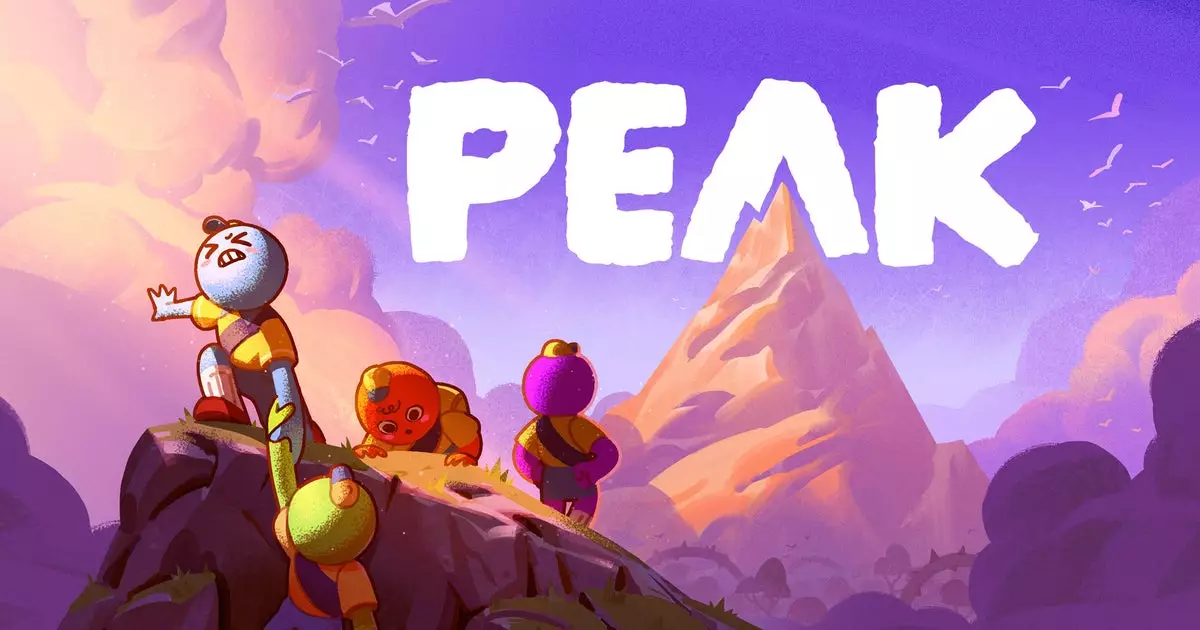In the realm of video game development, inspiration can often be elusive, but for the creators behind “Peak,” it came in the form of a friendly rivalry. This co-op mountain-climbing game, which intertwines adventure with camaraderie, was birthed during a collaborative game jam involving two indie powerhouses, Aggro Crab and Landfall. At the heart of this endeavor was founder Nick Kaman’s candid admission that “jealousy” sparked their creativity. The echo of success from Landfall’s previous project loomed large, teaching them that results could fluctuate wildly based on project length and effort.
Kaman’s confession might skirt the boundaries of jest, yet it underscores a profound truth in creativity: competition can ignite passion. Watching another team achieve stellar success—not just a success, but one that unfolded in a fraction of the time it took for their own three-year saga with “Another Crab’s Treasure”—served as both a motivator and a wake-up call. It illuminated the possibility that innovative, quality content could emerge from a place of spontaneity and urgency, challenging traditional development timelines.
A Preparation Like No Other
Before they plunged into game development, the team’s preparations were anything but ordinary. They gathered in a foreign Airbnb located in the vibrant neighborhood of Hongdae, South Korea, armed not just with their laptops but also a determination to push boundaries. Setting up their makeshift development hub involved an amusing trip to IKEA, transforming flat-packed furniture into a workspace that would host hours upon hours of brainstorming and coding.
The bond formed through this unique setup not only fostered creativity but also added an element of fun to their grueling work schedule. The act of assembling furniture symbolizes a deeper layer of collaboration—bringing raw materials together to create something functional and beautiful, akin to their approach to game design.
From a Hot Tub Pitch to a Collaborative Vision
The concept of “Peak” was birthed much earlier in a hot tub in Sweden, offering a glimpse into the breed of creativity that flourishes when great minds converge in seemingly random situations. Initially conceived as an ambiguous survival game, the idea evolved rapidly as discussions unfolded. The team quickly coalesced around a vision of lost scouts exploring an island, further enriching the game narrative with elements of macabre slapstick humor.
This spontaneous evolution is a poignant reminder of how collaboration can reshape concepts. When passionate individuals share their thoughts and visions, a powerful synergy can emerge, leading to ideas that transcend the original conception. The pivot from survival mechanics to cohesive teamwork and shared laughter reflects how flux in the creative process can yield more engaging and fun gameplay.
The Dynamics of Work and Play
The experience of developing “Peak” was peppered with intense focus and light-heartedness. According to Kaman, every day was a blend of work and social interactions that allowed for playful exploration of the game mechanics. This duality of purpose—striving for productivity while cherishing the camaraderie of shared meals and laughter—creates an environment where creativity can flourish unimpeded.
Such dynamics are crucial in indie game development, where resources are often limited but ingenuity abounds. The commitment to nurture a fun atmosphere allowed them not just to meet deadlines, but also to infuse their game with an authentic spirit that resonates with players. They didn’t just make “Peak” in a month; they crafted an experience that invites gamers to journey together.
A Cautionary Tale amidst Success
Although “Peak” has enjoyed significant commercial success, it is essential to discern the nuances of its journey. While many may view the game’s rapid development as a shortcut to triumph, seasoned developers know otherwise. The richness of experience and skill possessed by both Aggro Crab and Landfall cannot be overlooked. The game’s creation was not simply a matter of cramming a year’s worth of work into a month; it was an iteration borne from years of dedication, learning, and prior failures.
The lesson here transcends the myth of quick success in game development. “Peak” encourages aspiring developers to cultivate an environment where playfulness meets diligence. While “Peak” is a testament to the power of collaboration and creativity, it also serves as a gentle reminder that wisdom and experience are irreplaceable elements in the craft of game design.

